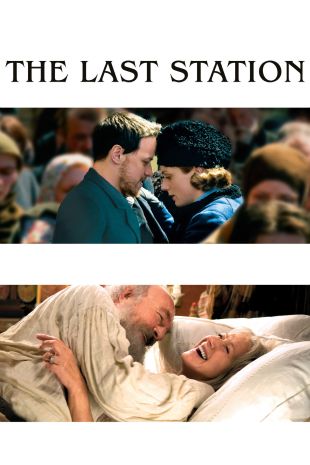
F. Scott Fitzgerald famously wrote that a first-rate intelligence is the ability to hold two opposed ideas in the mind at the same time, and still retain the ability to function. Michael Hoffman's The Last Station shows how another great writer, Leo Tolstoy, lived that quote.
In 1910, the elderly Tolstoy (Christopher Plummer) resides on a vast country estate with his wife of 45 years, Countess Sofya (Helen Mirren). The War and Peace scribe has become such a celebrated figure that his recent championing of celibacy and his opposition to private property have laid the foundation for something resembling a new religion, and a handful of true believers now live with the couple in order to be closer to their revered leader. His close confidant Chertkov (Paul Giamatti) wants the movement to grow, and persistently encourages the author to bequeath the copyrights of his novels to the fledgling organization. However, these manipulations put the sycophant at odds with the volatile, passionate Sofya, who believes that the family should inherit those copyrights.

Into this tense situation arrives Valentin (James McAvoy), a true believer in the movement who has been hired by Chertkov to be Tolstoy's new personal secretary -- as well as to be a spy for Chertkov, who, for legal reasons, is unable to travel to the Tolstoy estate. Not long after arriving, Valentin learns that his hero is a mass of contradictions who often disregards the rules of the movement named for him. Soon, Valentin finds himself struggling against the dictates of celibacy when he falls for the free-thinking, straightforward Masha (Kerry Condon), who has no problem picking and choosing what elements of the belief system best suit her needs. As Valentin learns more about Tolstoy's marriage, and discovers the pleasures of the flesh, his loyalties shift -- especially as the fight over the writer's legacy intensifies.
For a film that deals so intensely with a clash of ideas, The Last Station is a remarkably physical movie. From the passionate encounters between Valentin and Masha, to the slowly decaying body of Tolstoy, to Sofya's forceful temper tantrums, Hoffman and his actors never lose sight of the fact that people's efforts to live a spiritual life must coexist with the demands and limits of the flesh. Christopher Plummer's spectacular performance best embodies this complicated relationship between the mind and the body. You never question his attraction and affection for his wife, or his intense belief in his lofty ideals. You get the sense that as a younger man he had the ability to live with these inner conflicts, but that old age has sapped his strength -- though not the power of his convictions. James McAvoy also adroitly embodies these contradictions; he makes Valentin's lust for Masha as well as his quest for a higher morality both charming and heartbreaking -- the movie really is about his character's coming of age, and McAvoy successfully carries the emotional weight of the story.

There is a genuine warmth in The Last Station -- from Sebastian Edschmid's autumnal, golden cinematography to the emotional openness of the performers -- that elevates the movie from a garden-variety costume drama/historical biopic into a heartfelt examination of love's power to define our thoughts and actions, regardless of our age.
